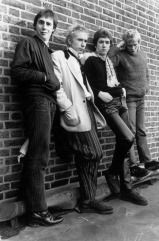Politics and Punk

Like most of rock music, punk was a reaction to society. The British economy was struggling in the mid-seventies and violence was prevalent in urban areas. Under these conditions a new population of disillusioned youth unable to find jobs or educational opportunities decided to lash back. They struck at British culture with aggressive and shocking lyrics over brash rushed rock performed in radical costumes in order to create a reaction in their audience (7) This isolation was expressed best in David Bowie’s works where he created ballads about characters isolated from their country or even their own planet like Ziggy Stardust. Additionally sticking true to punk’s art school roots, artists used the radical costumes to create an overall style that sought to exemplify the isolation the youth felt while offending older more traditional audiences. The Sex Pistols used punk in a more direct reaction against the politics of the era. Many members of the punk wave were “disillusioned at how jargonistic and non-committal leftwing politics had become” (8).
The Sex Pistols became a vehicle for this message. Songs such as “God Save the Queen” used the inflammatory punk style to mock the Queen’s government as meaningless and fascists (6). Another social issue that punk used as a rallying call was inspired by the influence of reggae and Rastafarianism interested an earlier use of isolation to create successful music. The Clash began to adopt some Jamaican styles and punks even started an afro-punk party calling for an end to racism (8). This call for racial equality echoes the artist’s of the British Invasion’s progressive views on race and equality. Other groups involved in overcoming social injustice later rose out of punk such as queercore and the riot grrrls (8). The landscape of the United States would not have fostered and probably not have tolerated such a radical style of rock making Britain once again ahead of the curve.
The Sex Pistols became a vehicle for this message. Songs such as “God Save the Queen” used the inflammatory punk style to mock the Queen’s government as meaningless and fascists (6). Another social issue that punk used as a rallying call was inspired by the influence of reggae and Rastafarianism interested an earlier use of isolation to create successful music. The Clash began to adopt some Jamaican styles and punks even started an afro-punk party calling for an end to racism (8). This call for racial equality echoes the artist’s of the British Invasion’s progressive views on race and equality. Other groups involved in overcoming social injustice later rose out of punk such as queercore and the riot grrrls (8). The landscape of the United States would not have fostered and probably not have tolerated such a radical style of rock making Britain once again ahead of the curve.
(6)- Bradley, Dick. Understanding Rock 'n' Roll. Buckingham: Open UP, 1992. Print.
(7)- Friendlander, Paul. Rock and Roll: A Social History. Boulder: Westview, 1996. Print.
(8)- Sabin, Roger. Punk Rock: so What? London: Routledge, 1999. Print.
(7)- Friendlander, Paul. Rock and Roll: A Social History. Boulder: Westview, 1996. Print.
(8)- Sabin, Roger. Punk Rock: so What? London: Routledge, 1999. Print.
